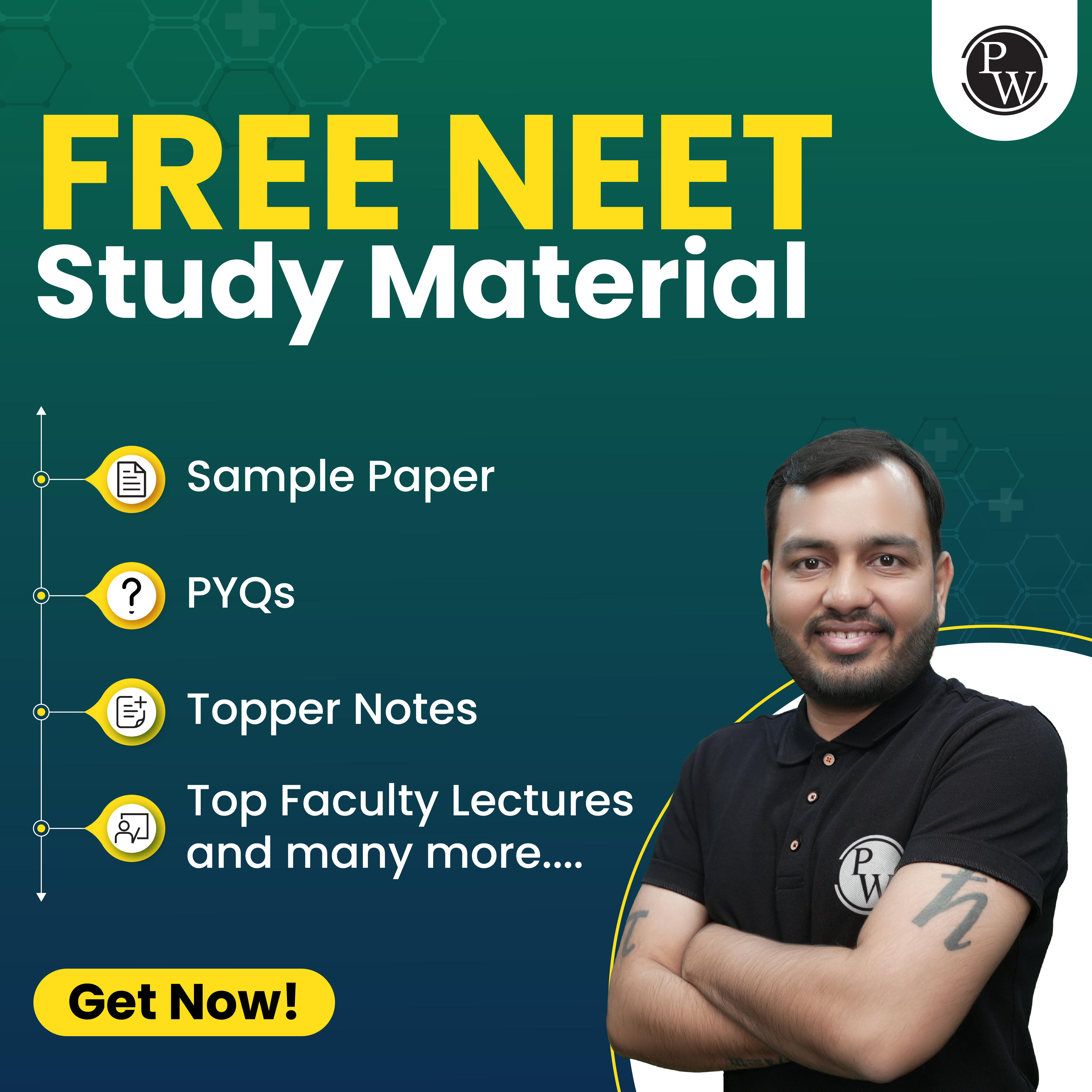
NEET Chemistry MCQs: The National Eligibility cum Entrance Test (NEET) is a tough exam for students who want to get into MBBS, BDS, and other medical courses. Many students think the NEET chemistry exam is easy and don’t study it enough, even though the NEET chemistry section can help them score well.
In fact, NEET Chemistry MCQs make up 25% of the exam, so it's important to spend as much time on the chemistry section as on physics and biology. NEET Chemistry MCQs are designed to test how well students understand basic chemistry concepts and their ability to solve problems.
The article below provides a chapter-wise list of NEET Chemistry MCQs and the important topics in the NEET Chemistry syllabus . It also includes recommendations for the best books to prepare and tips for answering questions correctly.
NEET Chemistry MCQs Overview
NEET Chemistry Multiple Choice Questions (MCQs) are designed to check how well students understand chemistry concepts for the NEET exam. These questions cover different topics from organic, inorganic, and physical chemistry, based on the NCERT syllabus for classes 11 and 12.
Practicing NEET Chemistry MCQs is very important. NEET Chemistry is often one of the easiest sections to score high in, so mastering these questions can improve your overall score. Regularly solving NEET Chemistry MCQs helps you strengthen your understanding of the material and shows you how to apply what you’ve learned to solve problems.
Also Check:
NEET Chemistry MCQ With Answers
Practicing chapter-wise NEET Chemistry MCQs is essential to prepare for NEET Chemistry effectively. Physics Wallah provides comprehensive NEET Chemistry MCQs with answers that can be very beneficial.
These chapter-wise resources help you identify your strengths and weaknesses, allowing you to concentrate on areas that need improvement. Practicing NEET Chemistry MCQs enhances your speed and accuracy, which is important during the exam when time is limited.
Additionally, it familiarizes you with the exam format, the types of questions, and the marking system, which can help reduce anxiety on exam day. Lastly, regular practice enables you to pinpoint topics that require more attention, allowing for focused revision.

Chapter Wise NEET Chemistry MCQ
Practicing chapter-wise NEET Chemistry MCQs for Class 11 and Class 12 is a great way to prepare, as it allows for targeted study. These questions help reinforce key concepts and improve your understanding.
Below is a table of chapter-wise NEET Chemistry MCQs, designed by experts to aid your preparation. Using these resources can help you build a solid foundation in Chemistry and boost your chances of success in the NEET exam.
Best NEET Chemistry MCQs Book
For effective NEET preparation, having the right resources is key. The Best NEET Chemistry Books from PW Store offers expertly curated content, extensive question banks, and detailed explanations, making it an essential tool for students. This book helps you master NEET Chemistry MCQs, build confidence, and excel in your studies.
Visit PW Store today to explore our wide range of educational resources and invest in your success with the best books for NEET preparation!
NEET Chemistry Important Topics 2025
NEET Chemistry Syllabus 2025 for Class 11 and Class 12 covers essential concepts that are important for advanced chemistry. Class 12 topics focus on more complex subjects like electrochemistry and chemical kinetics, which are key for understanding reaction mechanisms. The table below provides a reference to the important topics in the NEET Chemistry Syllabus 2025 for both classes based on previous years:
| NEET Chemistry Syllabus 2025 for Class 11 and 12 | |
|---|---|
| Chapters | Key Topics |
| NEET Chemistry Syllabus 2025 for Class 11 | |
| Basic Concepts of Chemistry | Mole Concept, Stoichiometry, Redox Reactions |
| Structure of Atom | Quantum Numbers, Electronic Configuration |
| Thermodynamics | Heat Capacity, Second Law of Thermodynamics |
| Equilibrium | Equilibrium Constant, Buffer Solutions |
| Organic Chemistry | Naming Compounds, Hydrocarbons |
| Chemical Bonding | Polarity, Molecular Orbital Theory |
| NEET Chemistry Syllabus 2025 for Class 12 | |
| Solutions | Colligative Properties, Abnormal Molar Masses |
| Chemical Kinetics | Reaction Rate Dependence |
| Electrochemistry | Electrochemical Cells, Kohlrausch’s Law |
| Haloalkanes and Haloarenes | Chemical Properties |
| Alcohols, Phenols, Ethers | Reactions of Alcohols and Phenols |
| Aldehydes, Ketones, Carboxylic Acids | Nucleophilic Addition, Oxidation, Reduction |
| Biomolecules | Glucose, Proteins, Nucleic Acids |
| Coordination Compounds | Ligands, Isomerism |
| d- and f- Block Elements | Properties of Transition Metals |
| p-Block Elements | Group 15 to Group 18 |
NEET Chemistry MCQs Chapter Wise Weightage
NEET Chemistry chapter-wise weightage for 2025 is important for planning your study schedule. This way, you can ensure you cover all the key topics thoroughly and feel well-prepared for the exam. The table below provides a NEET Chemistry Chapter Wise Weightage with average number of questions asked in the previous year's NEET exams.
| NEET Chemistry Syllabus 2025 Weightage | |||
| Class | Chapter Name | Average Number of Questions | Weightage |
| Physical Chemistry | Mole Concept | 2 | 5% |
| Atomic Structure & Nuclear Chemistry | 1 | 3% | |
| Gaseous State | 1 | 3% | |
| Thermodynamics & Thermochemistry | 1 | 3% | |
| Chemical Equilibrium | 1 | 3% | |
| Ionic Equilibrium | 2 | 4% | |
| Redox Reactions | 1 | 2% | |
| Solid State | 1 | 3% | |
| Solutions & Colligative Properties | 2 | 4% | |
| Electrochemistry | 1 | 3% | |
| Chemical Kinetics | 2 | 4% | |
| Surface Chemistry | 1 | 2% | |
| Organic Chemistry | Hydrocarbons | 2 | 4% |
| General Organic Chemistry | 2 | 5% | |
| Haloalkane | 1 | 2% | |
| Aldehydes, Ketones, and Carboxylic Acids | 2 | 3% | |
| Polymer | 1 | 2% | |
| Alcohol, Phenol, Alkyl Halide | 2 | 4% | |
| Aromatic Compounds | 3 | 6% | |
| Biomolecules | 2 | 4% | |
| Carbonyl Compounds | 2 | 4% | |
| Organic Compounds comprising Nitrogen | 2 | 3% | |
| Chemistry in Everyday Life | 2 | 3% | |
| Environmental Chemistry | 1 | 2% | |
| IUPAC & Isomerism | 2 | 4% | |
| Practical Organic Chemistry | 1 | 2% | |
| Inorganic Chemistry | Chemical Bonding | 4 | 9% |
| P-Block Elements | 3 | 7% | |
| Periodic Table & Periodicity in Properties | 2 | 4% | |
| Hydrogen | 1 | 2% | |
| S-Block Elements | 1 | 3% | |
| Coordination Compounds | 3 | 6% | |
| D and F-Block Elements | 2 | 4% | |
| Metallurgy | 1 | 2% | |
| Qualitative Analysis | 1 | 2% | |
How to Practice NEET Chemistry MCQs?
Following a structured approach while practicing NEET Chemistry MCQs is important to excel in the NEET exam and improve your NEET score. The following are some effective strategies for NEET preparation:
- Understand the Concepts: Ensure you have a solid grasp of the basic chemistry concepts before attempting NEET Chemistry MCQs . Utilize textbooks and reference materials for a strong foundation.
- Topic-wise Practice: Break down the syllabus into smaller sections and practice NEET Chemistry MCQs for each topic. This reinforces your knowledge and helps identify areas needing more attention.
- Timed Practice Sessions: Practice NEET Chemistry MCQs with a timer to simulate the exam environment. This will improve your speed and accuracy.
- Analyze Mistakes: After practicing, review your answers and learn from your mistakes to avoid repeating them in the future.
- Mock Tests: Regularly take full-length mock tests to simulate the actual NEET exam, helping you manage time and build confidence..
Why Choose PW For NEET Chemistry MCQs?
Opting for PW for your NEET Chemistry preparation comes with several benefits:
- Expert Faculty: Our experienced educators provide the best guidance to help you excel in your studies.
- Comprehensive Coverage: We cover all topics in the NEET Chemistry syllabus, ensuring thorough preparation for the NEET exam.
- Detailed Solutions: Each MCQ includes clear explanations, aiding your understanding of concepts.
- Regular Updates: Our question bank is frequently updated to reflect the latest trends and question types in the NEET exam.
- Interactive Learning: Our platform offers engaging tools like video lectures, quizzes, and doubt-clearing sessions for a more effective learning experience.
- Performance Analysis: We provide detailed tracking to help you monitor progress and pinpoint areas for improvement.
- Affordable Pricing: Quality education is offered at reasonable prices, making it accessible for more students.
- Community Support: Join our NEET community to share knowledge, receive support, and stay motivated throughout your NEET preparation journey.
With the best PW NEET online coaching, you’ll have the resources you need to succeed!
NEET Chemistry MCQs FAQs
How to score 180 in NEET chemistry?
Why are NEET chemistry MCQs important?
How is 160 NEET scored in chemistry?
Is chemistry hard in NEET?









